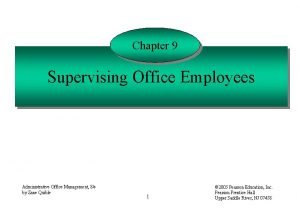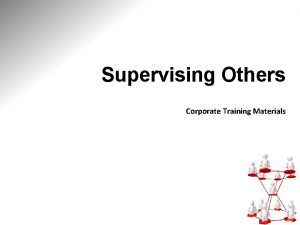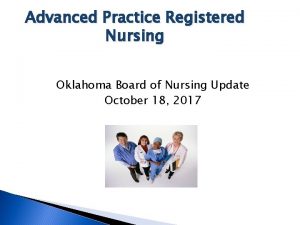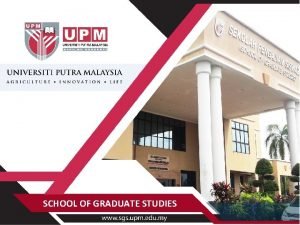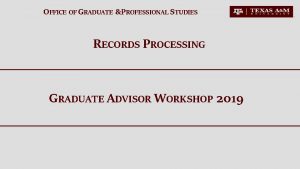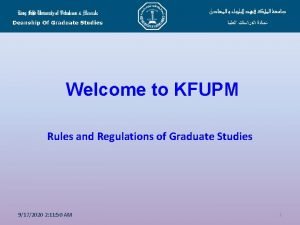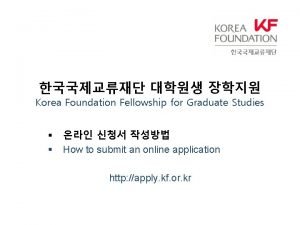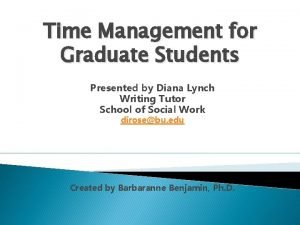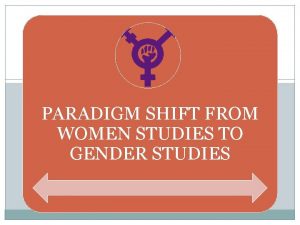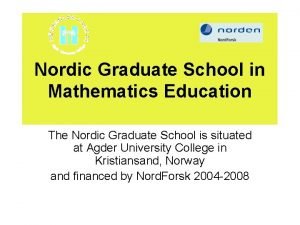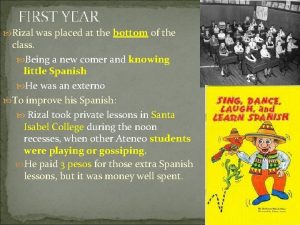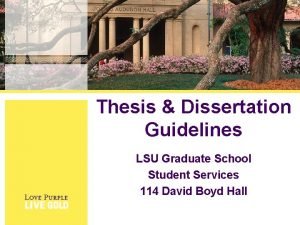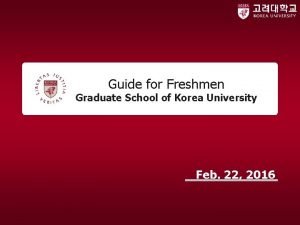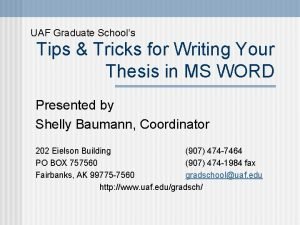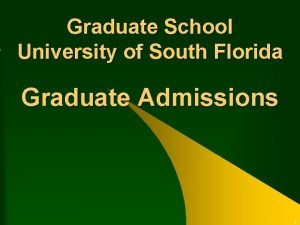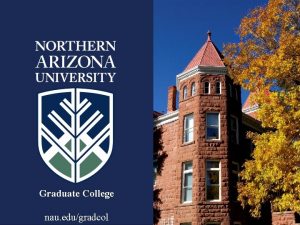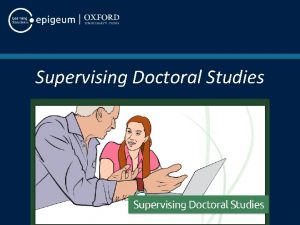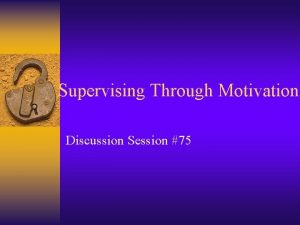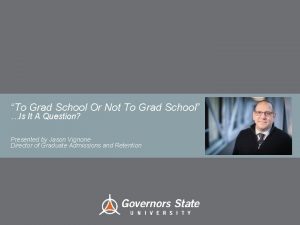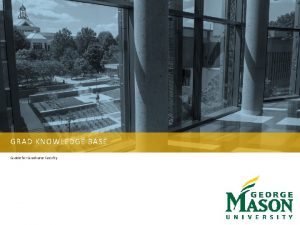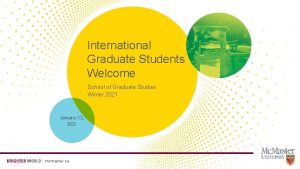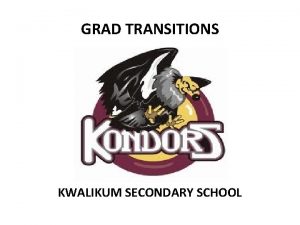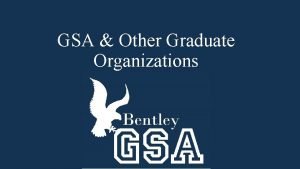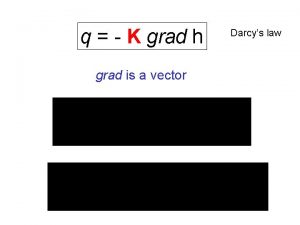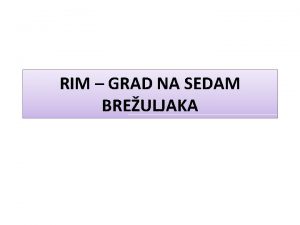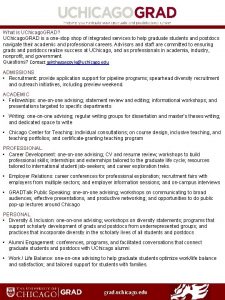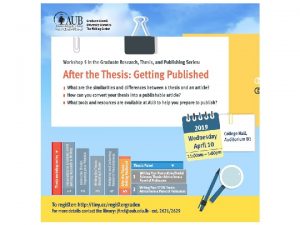School of Graduate Studies Supervising Graduate Students Grad




















- Slides: 20

School of Graduate Studies Supervising Graduate Students; Grad. Pro. Skills Fall 2020

Importance of the Student-Supervisor Relationship o At SGS we liked to describe a graduate student’s progress through their program as a ‘journey’ o As you embark on your own journey here at Concordia, realize that over the coming years (and hopefully decades), you will be assisting dozens of others (i. e. , your grad students) in successfully completing their journeys o It is important to start out on the right foot, and the School of Graduate Studies is here to help you with that o In addition to our role in formulating and enforcing academic regulations related to graduate programs, we provide numerous resources to help you and your students in your respective journeys

Resources o Supervision Guidelines o Master’s Guidelines o https: //www. concordia. ca/sgs/resources/handbooks/masterssupervision-guidelines. html o Ph. D Guidelines o https: //www. concordia. ca/sgs/resources/handbooks/phdsupervision-guidelines. html o Graduate Calendar o http: //www. concordia. ca/academics/graduate/calendar. html o Grad. Pro. Skills – offers numerous resources for students (workshops on thesis writing, time management, wellness, etc. ) – more on this later

Master’s Supervision Guidelines

Ph. D Supervision Guidelines

Graduate Calendar

Grad. Pro. Skills Statement of purpose: Empower Concordia graduate students and postdoctoral fellows to engage with community resources, optimize their graduate school experience and equip themselves to realize their professional and academic goals.

Grad. Pro. Skills Our offerings Workshops Events Records of Participation Job Opportunities Certificates Volunteer Opportunities Grad. Pro. Blog Social Media http: //www. concordia. ca/students/gradproskills. h tml

Grad. Pro. Skills Workshops Career Building Communication Success in Graduate School Software &Web Tools Language Training Teaching Leadership & Management Wellness & Life Balance http: //www. concordia. ca/students/gradproskills/ workshops. html

Near Completion & Post Graduation Thesis Boost: 3 -daywriting retreat http: //www. concordia. ca/students/ gradproskills/events/thesisboost. html Grad. Pro. Skills Events Midprogram 3 Minute Thesis & Project Competition http: //www. concordia. ca/students/gradproskills/events/3 minute-thesis. html Early Program Graduate School Base Camp http: //www. concordia. ca/students/gradprosk ills/events/grad-school-base-camp-

Supervising Graduate Students: Getting Started o “A beginning is a very delicate time” – Frank Herbert (Dune) o The first graduate students you select will have an enormous impact on your research productivity (positive or negative) o Be selective! If possible, don’t accept the first applicants that come across your desk – especially if their academic performance is not strong (i. e. , c. GPA ~ 3. 0) o Very strong academic performance does not necessarily correlate with very strong research performance; HOWEVER, weak academic performance usually correlates with weak research performance

Advice on Selecting Graduate Students for Supervision o Review application dossiers very carefully: Assess overall academic performance Read letters of reference carefully (learn to read between the lines!) Undergraduate research experience in your field is usually a big plus When appropriate, pay attention to your Graduate Admissions Committee’s screening reports (for example, the phrase “interview carefully” is commonly indicative of an extremely marginal candidate)

Advice on Selecting Graduate Students for Supervision (cont’d) o When possible, interview a prospective student beforehand (in person is ideal, otherwise use Skype/Zoom for international applicants (or during COVID!)) o You may want to consider starting with a Master’s student first – if the student is really good, they can fast-track to the Ph. D program later (usually after about a year in-program) o Ph. D students are a much greater commitment on your part, especially in terms of program duration (4 -6 years)

Funding o For good students (i. e. , high c. GPA, research publications, etc. ) there ample opportunities for award funding to supplement the student’s base stipend External funding (Tricouncil awards (e. g. , CGS-M, PGS-D, Vanier), Quebec, etc. ) Internal funding (Concordia merit, International tuition remissions (Ph. D only), faculty-specific awards These awards typically supplement a graduate student’s base stipend (PI contribution + TA earnings) – in the absence of a big Tricouncil award, the majority of a student’s base stipend will typically come from your research grants o The more Tricouncil grant funding brought in to Concordia, the more Tricouncil award funding allocated to Concordia

Mentoring o Your role is to develop your graduate students into independent researchers; don’t micromanage when possible – advise from arms’ length (more so for Ph. D students, Masters students are usually more ‘hands on’) o Guide your students through their entire grad school experience (make sure you’re familiar with the degree requirements for their program): their success reflects your success as a supervisor (granting agencies pay attention to this as well: e. g. , NSERC HQP evaluation accounts for 1/3 of a typical Discovery Grant funding decision) o Provide guidance in scholarly writing skills in your field – especially important for international students who don’t have English as a first language

Mentoring (cont’d) o Establish clear expectations from the start: Funding (especially what you’ll be contributing) Authorship policies (this can be a very sensitive topic – best to be up -front about how co-authorships will work at the start of a project) Selection of a research topic Timeline to completion o Provide feedback on a regular basis – weekly through one-on-one or group meetings, daily on a more informal basis when possible Public feedback – seminars, conference presentations, etc. – be positive and constructive Private feedback – can be more critical

Difficult Situations o Deal with problems as soon as they arise – don’t let things fester; early confrontations (when done constructively and professionally) can save a lot of grief down the road o When dealing with a problem, try to find a resolution that’s mutually satisfactory to you and the student o For especially difficult situations, it’s always good practice to communicate with the student in writing as well as verbally; for example, an email summarizing an important conversation about expectations within a defined timeline, clearly laying out the next steps, etc.

Difficult Situations (cont’d) o For ongoing problem cases: build a documentation trail (emails, supervisory committee reports, etc. ) – this can be very useful later on, especially if GPD intervention is required, or if you want to declare formal withdrawal from supervision of a student o Seek advice from senior colleagues, your GPD, and SGS (but first try to work with GPD) o In some (rare) cases, resolution of problems is irreconcilable and you may need to withdraw from supervising a student; do not take this lightly! Build a documentation trail Get input from the student’s supervisory committee Follow the procedures laid out in the supervision guidelines o Keep in mind that a student can also formally withdraw from your supervision (see Supervision Guidelines for procedures)

Have Fun! One of the most rewarding aspects of our jobs is seeing our graduate students go on to their own successful careers.

 Supervising office employees
Supervising office employees Corporate training materials
Corporate training materials Oklahoma board of nursing
Oklahoma board of nursing Upm sgs
Upm sgs Ajou university graduate school
Ajou university graduate school Ogaps
Ogaps Kfupm registrar
Kfupm registrar Graduate studies fellowship programs (korea foundation)
Graduate studies fellowship programs (korea foundation) Time management for graduate students
Time management for graduate students Paradigm shift from women studies to gender studies
Paradigm shift from women studies to gender studies Usu grad school
Usu grad school Andreas ryve
Andreas ryve Write-up sample for graduation
Write-up sample for graduation Why did rizal salute to luna and hidalgo
Why did rizal salute to luna and hidalgo Lsu thesis and dissertation
Lsu thesis and dissertation Sugang korea ac kr graduate
Sugang korea ac kr graduate High school honor graduate requirements georgia
High school honor graduate requirements georgia Jesus seminary
Jesus seminary Uaf microsoft office
Uaf microsoft office University of florida graduate school
University of florida graduate school Nau graduate application
Nau graduate application
